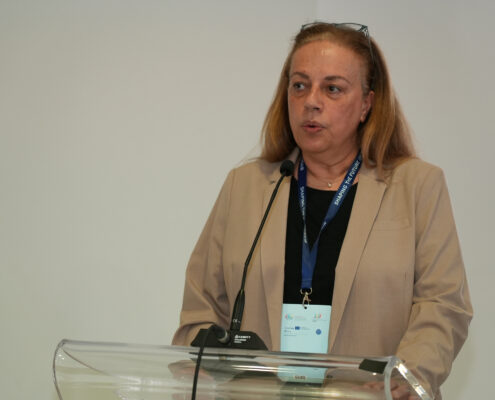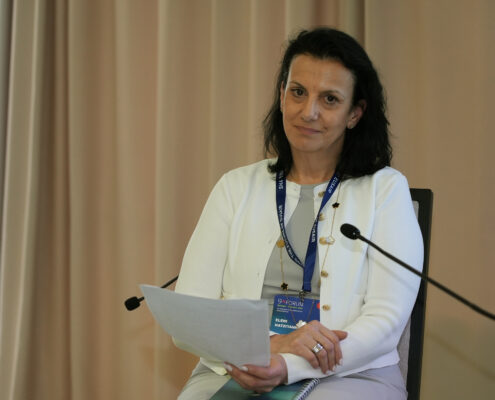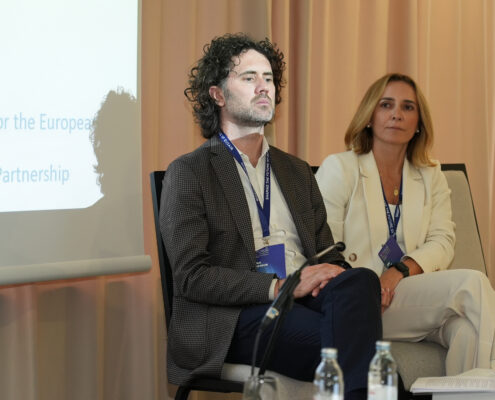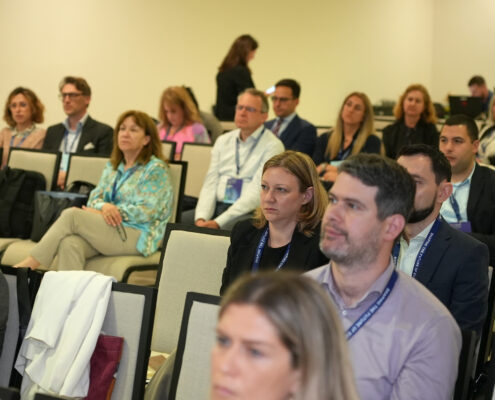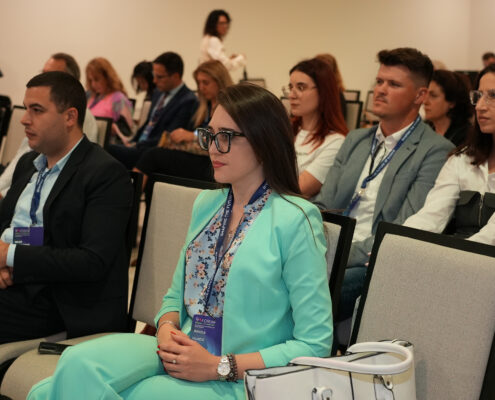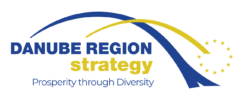9th Annual EUSAIR Forum
Šibenik, Croatia | 15 - 16 May 2024CONCLUSIONS OF THE PILLAR I SESSION:
Towards a sustainable, human centric and resilient A-I maritime industry
Eleni Hatziyanni, Policy Officer- DG MARE, highlighted the following points:
- Blue skills are needed to support the new approach to a sustainable blue economy, which aims to contribute to achieving the dual challenge of the European Green Deal and the Recovery Plan for Europe: making Europe's economy fairer, more resilient, and more sustainable for future generations.
- EU has launched trans-sectorial skills initiatives: the European Year of Skills and the Pact for Skills, aiming to support private and public organizations. EU also encourages employers, trade unions, and any other relevant stakeholders to take action to upskill and reskill Europe's workers. However, cooperation between education, government, science, and businesses is fundamental. At the Adriatic Ionian region, EUSAIR prioritizes activities on skills, promoting the EU Pact for Skills.
- In the maritime industrial ecosystem, including public authorities, associations, and SMEs, cooperative partnerships are supported by EU funds and provide upskilling and reskilling opportunities for people working in the maritime sectors and for the young generation to join this particular working environment.
- With regard to blue skills, the EU supports, through ERDF, ESF, EMFAF and Horizon funds, projects for skills development in the blue economy and has established a large-scale partnership under the Pact for Skills in Maritime Technologies. The EU is also reskilling workers from other sectors while improving the image of blue careers and developing blue skills across the EU.
Carlo Kraskovic Senior Project Manager Maritime Technology Cluster FVG - mareFVG (IT), introduced the role of the Maritime Technology Cluster (mareFVG) as a tool of regional development policy. MareFVG is a vital component of the Friuli Venezia Giulia Region's Smart Specialization Strategy, serving as a critical catalyst for regional development in maritime technologies for enterprises, universities, research centers, and training institutions, fostering collaboration to enhance competitiveness collectively. The role of the Cluster in promoting skills intelligence, bridging the gap between the industry and education and training institutions, facilitating upskilling and reskilling in the Region: The Capability Blue Hub project.
A very interesting point was that mareFVG has subscribed to the Pact for Skills in two of the 14 industrial ecosystems and is largely involved in the partnerships implementing them:
- Shipbuilding and Maritime Technology - Supported by projects CHAlleNGE 4S and LeaderSHIP
- Offshore Renewable Energy – supported by project FLORES
He proposed a cooperation on Macroregional EUSAIR level towards an Adriatic Ionian (macro)Regional Partnership under the Pact for Skills.
The most important dimension(s) in terms of AI Regional Cooperation could be:
- Helping the Adriatic Ionian Macro Region find effective solutions to address the challenges associated with the skills required for the maritime industry's green and digital transition.
- Facilitating dialogue between industry, R&D institutions, social partners, and education and training providers to comprehensively understand the current and future challenges regarding upskilling and reskilling in the blue sector.
Ana Odak, President of MARINN – Maritime Innovation Center (HR) introduced the cluster members from Croatia, Italy, Slovenia, Austria, Germany, Norway, and Spain and its objectives: to develop autonomous vessels, clean drive (hydrogen), smart and green marinas, green technologies, development and training of human potential for future jobs in the maritime industry. She introduced EU-funded projects in collaboration with the Academic community: The North Adriatic Hydrogen Valley project funded by Horizon to promote the "quadruple helix" model, the Eccentric project funded by Croatia- Italy Interreg program to strengthen the collaboration between the emerging sectors of the blue economy, and Smart blue Tourism funded by RRF to develop students and professionals skills.
Prof. Maria Boile, CERTH – Center for Research and Technology, University of Peraeus introduced the Waterborne Technology Platform and its strategic research and innovation agenda for Blue growth and the Skills for a Sustainable Blue Economy proposals
- A competitive, resilient, and socially fair blue economy needs highly qualified and skilled professionals.
- Labor market needs - good understanding, anticipate needs based on technology development and pace of advancement of emerging sectors
- Developments in the economy, technology, environment drive innovation and change
- Life-long specialization vs life-long learning
- Soft and hard skills mix, and cross disciplinary education and training for multicultural environment
- Flexibility in skills acquisition, formal and informal learning according to labour market needs
- Upskilling & re-skilling, emphasis on supporting SMEs
- Competency based training, transferable skills
- Increase women’s participation in male-dominated jobs
TO CONCLUDE
1)Both in traditional and emerging maritime industry sectors, skills, and capabilities are today a priority element for the competitiveness of A-I enterprises with emphasis on supporting SMEs
2) Skills are also necessary for the maritime industry's green and digital transition and social cohesion in the local communities. EU has launched trans-sectorial skills initiatives: the European Year of Skills, S3 and the Pact for Skills, aiming to support private and public organizations. EU also encourages employers, trade unions, and any other relevant stakeholders to take action to upskill and reskill Europe's workers. However, cooperation between education, government, science, and businesses is fundamental. At the Adriatic Ionian region, EUSAIR through its revision prioritizes activities on skills, promoting the EU Pact for Skills.
3) It will be helpful to capitalize on the MARINN cluster experience, the ‘’Waterborne Technology Platform’’ and its strategic research and innovation agenda for Blue growth, and the mareFVG (Friuli Venezia Giulia region's) experience of its participation in the Pact for Skills of the two industrial ecosystems: Shipbuilding and Maritime Technology and Offshore Renewable Energy and to facilitate a constructive dialogue and networking among the SBE stakeholders.
4)In the framework of the ongoing process of revision of the EUSAIR Action Plan and during the implementation phase of the new EUSAIR Action Plan it is needed the promotion of new networks of training/education bodies, research centers, and higher education institutions and industry-aimed at developing /sharing of blue and green skills programs. Their outputs could be further developed by launching a Pact for Skills for the Adriatic and Ionian Region, facilitating cooperation, and establishing a large-scale macroregional partnership in the blue sustainable economy in the Adriatic and Ionian regions.
5) Last remark from the Point of view of the EC concerning the monitoring, embedding and funding of innovative and Skills Partnerships actions and projects:
SBE stakeholders and SMEs, research and education Institutions, Clusters, and Large Scale Partnerships for Skills could cooperate with DG Regio, DG Mare, DG Empl., DG Grow, DG Energy and other EU Institutions to utilize and adjust the industrial ecosystems of the Pact for Skills and use the central respective EU funds: ERDF, ESF, and Horizon and the new growth plan for WB programs. These funds and programs are particularly relevant to the blue economy sector as they can be used to develop the needed institutional and financial programs to support the green and digital transition. We can monitor the progress of the upskilling and reskilling objectives in the actions included in the revised EUSAIR Action Plan in Pillar 1 and all Pillars through the Interreg and mainstream regional and sectoral cohesion policy programs via the EC SFC data basis by monitoring the approved projects per specific objective and their respective financial allocations via the MRS report biennially. We should take into account that according to CPR and the EC SWD 198/8-7-21 on monitoring and evaluation of EU Cohesion Policy, funds, and Programmes are included:
- In Policy Objective 1: Smart and Innovative Europe, the Specific Objective 1.4/via ERDF and EMFAF: Developing Skills for Smart Specialisation, Industrial Transition and Entrepreneurship. and b) In Policy Objective 4: Social and Inclusive Europe, the Specific Objective 4.2/via ESF: equal access to education, training, and lifelong learning.
Therefore, the cooperation and networking of TSG members and key stakeholders with the Managing Authorities of the EU Cohesion Policy Programmes mainly through the IPA Adrion Governance Support Projects is a prerequisite for effective and efficient formulation and implementation of the Pillar 1 Actions and Projects supporting the innovative and inclusive skills activities and partnerships impacting on the needed green and digital transition of the Sustainable blue economy sector.
Mr. Georgios Emmanouil/DG REGIO





